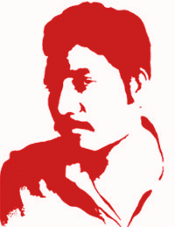The Proletarian Party of East Bengal produced the original Bengali document in 1972
The Communist Party Marxist-Leninist-Maoist Bangladesh translated the document in English and published online via www.sarbaharapath.com on 4 August 2014. The party slightly edited the translation on 18 January 2017
‘One divides into two’ is a fundamental law of dialectics, and applicable to human thinking, nature and society, that is, universally applicable to everywhere.
This fundamental law of dialectics is applicable to party and comrades too.
In party, comrades use to split in two sides on each question. Some comrades grasp proletarian outlook and working style while in opposition to that, other comrades leave that. This two line’s struggle goes on. If proletarian revolutionaries’ line achieves victory and party accepts that, party remains revolutionary.
Also the comrades can be classified into two: his or her proletarian aspect and non-proletarian aspect. Constant struggle goes on between the two sides. The principal aspect determines the real character of the comrade.
He or she is revolutionary whose revolutionary aspect is principal, while he or she is non- revolutionary or counterrevolutionary or opportunist whose non-revolutionary aspect is principal.
Two line’s struggle was carried in the Proletarian party of East Bengal on whether or not communists may have some personal interest, and on whether sexual interest will be under revolutionary interest or vice versa.
The Fazlu-Sultan clique put forward reactionary theories like ‘Communists will have some personal interest’, ‘Revolutionary interest will be under sexual interest’ etc.
In opposition to that, the Central Committee led by comrade Siraj Sikder put forward the proletarian line that the communists will have no individual interest, sexual interest will be under revolutionary interest; and they remained firm in principle. This two line’s struggle continued. The central committee and party completely rejected the reactionary theory of the Fazlu-Sultan clique.
Being proven bankrupt in that theoretical struggle, other than being repentant, they brought the theory that communists will have individual interest, took reactionary organizational step in greed for party-post, leadership and power, hatched conspiracy, spread rumor, posed as double dealer, falsified, made clique, stole money and arms of party, hatched conspiracy of secret killing and at last fled from party.
The reason behind their above mentioned end is that they neither have analyzed own bad and good aspects, proletarian and non-proletarian aspects to remain cautious against bad and non-proletarian aspects, nor struggled against those and verified themselves.
Thus, the non-proletarian and bad aspects inside them got prominence, they became reactionary and did harm to party and people.
If the central committee led by comrade Siraj Sikder had accepted their reactionary theories without carrying struggle against those, then the whole party had to surrender to opportunism and deviations, soon party would be a party that is opportunist that gives prominence to sexual interest, is protector of individual interest, that is, party would be bourgeoisie reactionary party like Awami League. No comrade and people will want that end of party.
Chairman Mao said, “A human being has arteries and veins through which the heart makes the blood circulate, and he breathes with his lungs, exhaling carbon dioxide and inhaling fresh oxygen, that is, getting rid of the stale and taking in the fresh. A proletarian party must also get rid of the stale and take in the fresh, for only thus can it be full of vitality. Without eliminating waste matter and absorbing fresh blood the Party has no vigor.”
That means, always some cadres do not verify themselves strictly, carry struggle against own non-proletarian and bad aspects, own individual interest, be firm in principle of opposing revisionism, so, slowly the non-proletarian aspect inside them may get prominence. As a result they may be transformed into non-proletarian, backward, rotten comrades, even reactionary and counterrevolutionary.
Party must eliminate those waste matters, absorb fresh blood and always keep vigor.
Thus, party is always being divided into two: Proletarian revolutionary and opportunist reactionary counterrevolutionary.
We have to abide by this general law of the development of matter via split, always remain separate from opportunists and counterrevolutionaries and keep revolutionary character of organization by expelling those.
The principle of unity with them, that is, correcting them through keeping them inside is against the laws of matter.
The end of that is to push party in face of internal and external enemy artillery. In such a situation, party can do nothing.
This is why party gets stronger by expelling the opportunists, reactionaries, counterrevolutionaries, cliques, factionalists and purging the degenerated elements.
Since the formation of the Proletarian party of East Bengal and the East Bengal Workers Movement, the process of ‘purge dirt and take green’ is going on in rank and file. That is why party is always full of vigor.
Many members of the first Revolutionary Council of the East Bengal Workers Movement were purged because they were waste. New cadres took their place. Even some of later ones were also purged because of being waste.
The same process will go in the Proletarian Party of East Bengal. This is the material law of development of party.
We see in the Chinese party history, the Chairman of the Central Committee Chen Tu-tsiu at last became secret police of Chiang Ki-shek. Important leader of party Chen Kao-To similarly became secret police. Such type of many more events happened.
Later, Liu Chao Chi and many other leaders became revisionists.
Therefore, it is not surprising for any cadre to be opportunist, clique, conspirator or counterrevolutionary.
Therefore, the transformation of the Fazlu-Sultan clique into opportunist and clique is not any surprising event. The great responsibility of the revolutionaries of the Proletarian Party of East Bengal is to apply the theory of one divides into two to themselves, regularly find out own proletarian and non-proletarian aspects, good and bad aspects, fight against own non-proletarian and bad aspects, strictly verify themselves, make criticism-self-criticism, make effort to be a lifelong revolutionary and take lesson from the negative example of the Fazlu-Sultan clique. ■

